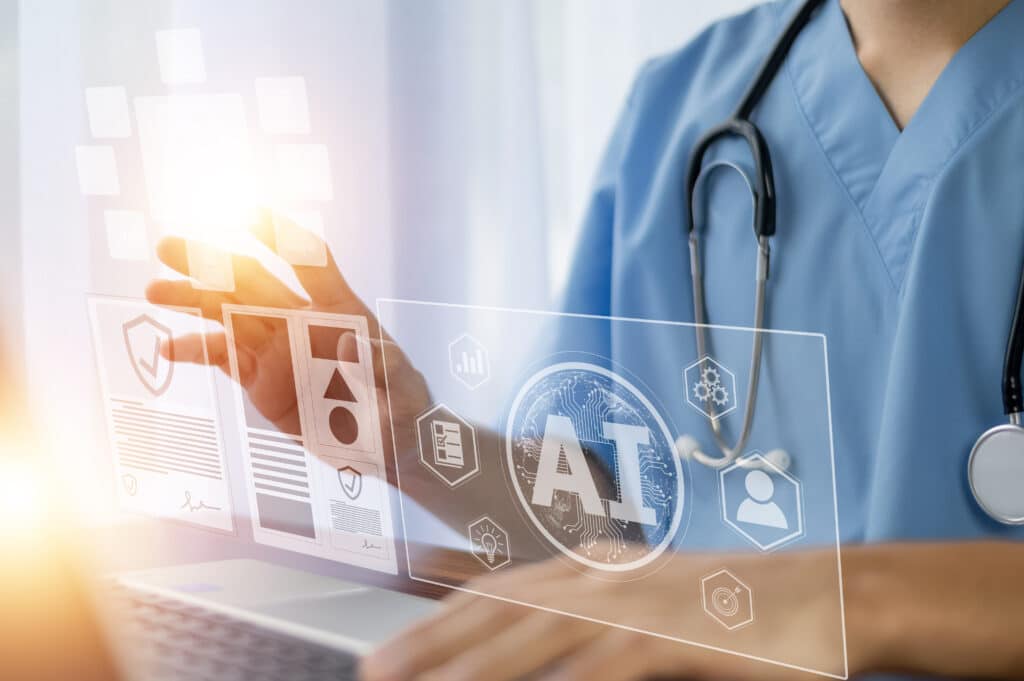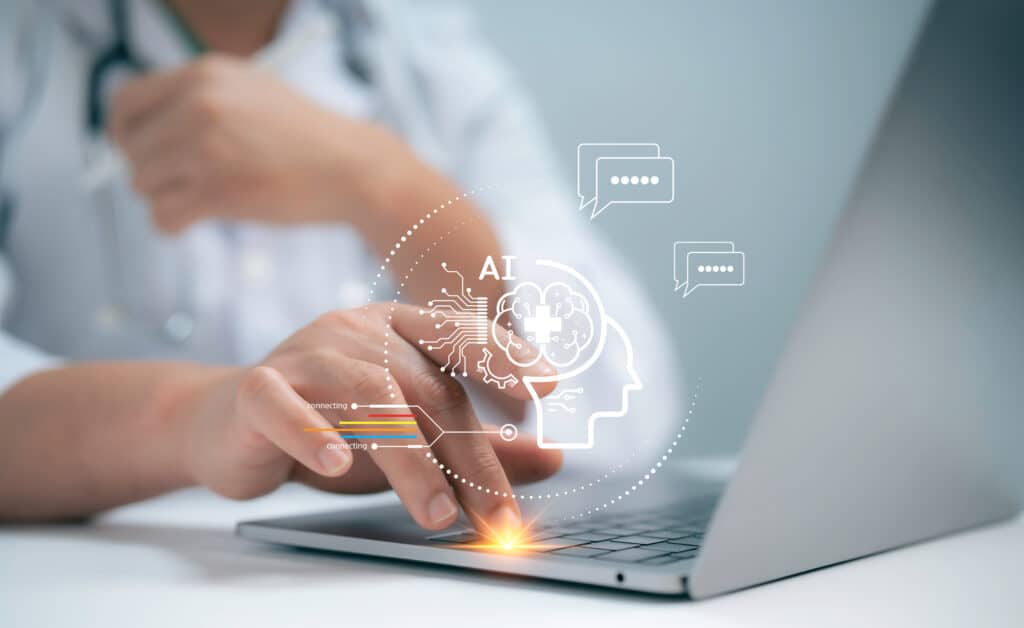
Exploring the convergence of artificial intelligence (AI) and electronic health record (EHR) systems reveals a new era of healthcare. This article decodes how AI powers EHRs to offer precise, personalized, and predictive care. Topics we cover will include:
- AI in healthcare
- How AI improves and transforms EHR software
- The future of AI in EHR
Join us as we delve into the innovative realm where AI in EHR is not just about advancements and cost-savings but about real human impact.
The Role of AI in the Healthcare Market
Boosting ROI
The global outlook of AI in the healthcare market was estimated at 19.27 billion in 2023. Now, the industry expects an annual growth of 38.5% to reach an estimated revenue of 208.2 billion in 2030.
AI also has a demonstrable ROI, with healthcare organizations realizing a return on their AI investments within 14 months and an average return of $3.20 for every $1 they invest in the technology. This market value is impressive, to say the least. But how has artificial intelligence changed the landscape of patient care?
Elevating Patient Outcomes
Currently, 79% of healthcare organizations utilize AI technology and are experiencing unparalleled transformations. Clinical processes, risk management, and decision-making enhanced by AI (and its algorithms) are leading to:
- Improved performance and diagnosis
- Reduced care costs
- An overall increase in the value of care
For example, one review found generative AI has demonstrated 99% accuracy and is faster than humans in evaluating and analyzing mammograms. This technology makes it possible to diagnose breast cancer more quickly, improving imaging costs. These AI innovations redefine patient outcomes and the overall “care” experience. But how can this technology improve your practice and the day-to-day management of electronic health records? Read on to learn more.

How AI Transforms EHR Software
EHR adoption aims to streamline clinical workflows while bolstering cost-effective care delivery. Still, medical practices cite clinical documentation and paperwork as sources of EHR burden and burnout.
AI tools are vital to addressing these issues and giving providers back their time to focus on patients. According to one scientific review, AI-driven analysis of patient data within EHRs leads to more accurate diagnoses by:
- Detecting patterns and anomalies that might elude even the most experienced clinicians.
- Processing vast amounts of health records to uncover hidden correlations.
But what about administrative workflows, practice management, and billing? Below, we discuss the key benefits of AI in EHR and how it can transform your medical practice.
Streamlining Clinical Documentation
The introduction of generative AI into clinical documentation is revolutionizing patient care management. With the implementation of natural language processing and machine learning, EHRs are now capable of:
- Transforming dense text narratives into structured data that can be easily searched.
- Making crucial patient information more accessible.
- Drastically cutting down the time spent by healthcare professionals on administrative duties.
AI-powered tools such as voice recognition, customizable clinical templates, and other “smart” data entry features are changing how clinical notes are created and managed, streamlining the handling of patient records.
Improving Patient Management and Communication
Patient engagement is critical to a successful healthcare journey, and generative AI EHR software is revolutionizing this process. Artificial intelligence in EHRs opens new communication channels between medical staff and patients, bridging gaps and building stronger relationships. How? These tools can perform tasks such as:
- Increasing patient records management through features like speech-to-text.
- Allowing patients to sign in independently through check-in kiosk stations, eliminating extra data entry work.
- Fully automating administrative tasks like appointment scheduling or clinical documentation design.
For example, EHR platforms like DrChrono send patients custom text reminders before appointments with a schedule of messages. Patients can then confirm via phone or email, automatically updating their appointment into the EHR app or desktop.
These features free up money that can be funneled back into the practice. It also helps free up the valuable time of medical professionals so they can provide more care and a deeper level of attention to patients.

Securing Data Privacy
The increase in electronic health records necessitates robust security measures to protect sensitive patient information. Real-time anomaly detection within EHRs, bolstered by generative AI, strengthens cybersecurity measures, safeguarding against potential breaches. Artificial intelligence tools also help practices:
- Adhere to everchanging data protection regulations
- Implement robust encryption
- Perform regular security audits to protect private information
AI in EHRs also helps providers stay HIPAA-compliant. For example, the Updox software platform has an eFax tool that allows providers to send digital documents through a secure, HIPAA-compliant inbox, optimizing workflow safely and efficiently.
Simplifying Billing and RCM
Effective billing, claims oversight, and revenue cycle management (RCM) ensures that practices can focus on providing high-quality care. AI tools effectively optimize revenue operations that often require heavy lifting on the administrative side, such as medical coding.
For example, CollaborateMD practice management software provides a Charge Capture app that manages patient notes, billing codes, and rounding lists. These features cater to the specific needs of any organization, from specialty practices to large ones.
AI’s Next Steps in EHR
Artificial intelligence is at the forefront of a patient care revolution. The Mayo Clinic hopes that the future of this technology could help create new ways to diagnose, treat, and cure disease by:
- Forecasting disease-risk years in advance.
- Choosing and matching patients with promising clinical trials.
- Designing and setting up remote health monitoring devices.
Generative AI EHR software is poised to continue revolutionizing practices and healthcare organizations. For example, artificial intelligence features such as natural language processing, machine learning algorithms, and predictive analytics are examining the growing volume of EHR data and providing actionable insights to medical practitioners. These measures will significantly reduce future EHR error probabilities, increasing the quality of care.
According to CMS.org, “EHRs are the next step in the continued progress of healthcare that can strengthen the relationship between clinicians and patients. The data, and the timeliness and availability of it, will enable providers to make better decisions and provide better care.”




